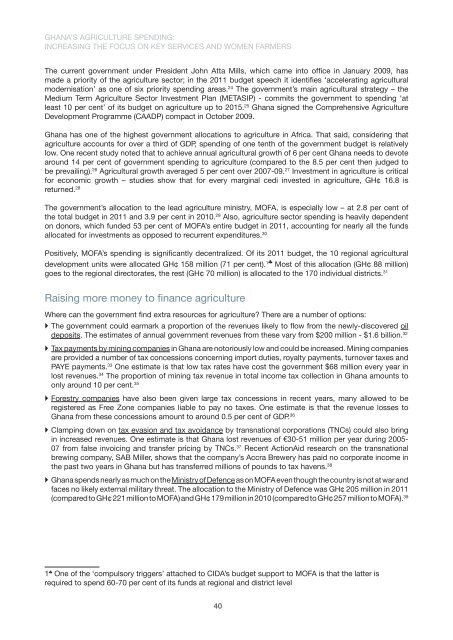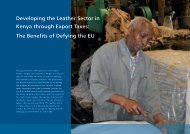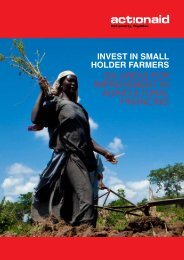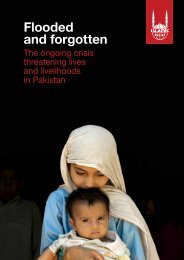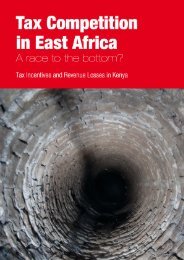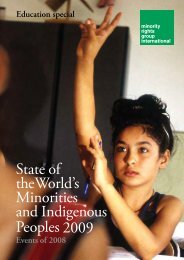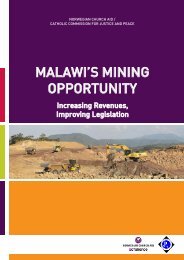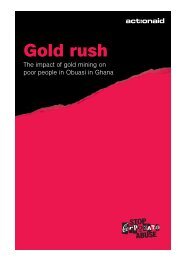IMPROVING AFRICAN AGRICULTURE SPENDING ... - Africa Adapt
IMPROVING AFRICAN AGRICULTURE SPENDING ... - Africa Adapt
IMPROVING AFRICAN AGRICULTURE SPENDING ... - Africa Adapt
Create successful ePaper yourself
Turn your PDF publications into a flip-book with our unique Google optimized e-Paper software.
GHANA’S <strong>AGRICULTURE</strong> <strong>SPENDING</strong>:<br />
INCREASING THE FOCUS ON KEY SERVICES AND WOMEN FARMERS<br />
The current government under President John Atta Mills, which came into office in January 2009, has<br />
made a priority of the agriculture sector; in the 2011 budget speech it identifies ‘accelerating agricultural<br />
modernisation’ as one of six priority spending areas. 24 The government’s main agricultural strategy – the<br />
Medium Term Agriculture Sector Investment Plan (METASIP) - commits the government to spending ‘at<br />
least 10 per cent’ of its budget on agriculture up to 2015. 25 Ghana signed the Comprehensive Agriculture<br />
Development Programme (CAADP) compact in October 2009.<br />
Ghana has one of the highest government allocations to agriculture in <strong>Africa</strong>. That said, considering that<br />
agriculture accounts for over a third of GDP, spending of one tenth of the government budget is relatively<br />
low. One recent study noted that to achieve annual agricultural growth of 6 per cent Ghana needs to devote<br />
around 14 per cent of government spending to agriculture (compared to the 8.5 per cent then judged to<br />
be prevailing). 26 Agricultural growth averaged 5 per cent over 2007-09. 27 Investment in agriculture is critical<br />
for economic growth – studies show that for every marginal cedi invested in agriculture, GH¢ 16.8 is<br />
returned. 28<br />
The government’s allocation to the lead agriculture ministry, MOFA, is especially low – at 2.8 per cent of<br />
the total budget in 2011 and 3.9 per cent in 2010. 29 Also, agriculture sector spending is heavily dependent<br />
on donors, which funded 53 per cent of MOFA’s entire budget in 2011, accounting for nearly all the funds<br />
allocated for investments as opposed to recurrent expenditures. 30<br />
Positively, MOFA’s spending is significantly decentralized. Of its 2011 budget, the 10 regional agricultural<br />
development units were allocated GH¢ 158 million (71 per cent). 1♣ Most of this allocation (GH¢ 88 million)<br />
goes to the regional directorates, the rest (GH¢ 70 million) is allocated to the 170 individual districts. 31<br />
Raising more money to finance agriculture<br />
Where can the government find extra resources for agriculture? There are a number of options:<br />
``The government could earmark a proportion of the revenues likely to flow from the newly-discovered oil<br />
deposits. The estimates of annual government revenues from these vary from $200 million - $1.6 billion. 32<br />
` `Tax payments by mining companies in Ghana are notoriously low and could be increased. Mining companies<br />
are provided a number of tax concessions concerning import duties, royalty payments, turnover taxes and<br />
PAYE payments. 33 One estimate is that low tax rates have cost the government $68 million every year in<br />
lost revenues. 34 The proportion of mining tax revenue in total income tax collection in Ghana amounts to<br />
only around 10 per cent. 35<br />
` `Forestry companies have also been given large tax concessions in recent years, many allowed to be<br />
registered as Free Zone companies liable to pay no taxes. One estimate is that the revenue losses to<br />
Ghana from these concessions amount to around 0.5 per cent of GDP. 36<br />
``Clamping down on tax evasion and tax avoidance by transnational corporations (TNCs) could also bring<br />
in increased revenues. One estimate is that Ghana lost revenues of €30-51 million per year during 2005-<br />
07 from false invoicing and transfer pricing by TNCs. 37 Recent ActionAid research on the transnational<br />
brewing company, SAB Miller, shows that the company’s Accra Brewery has paid no corporate income in<br />
the past two years in Ghana but has transferred millions of pounds to tax havens. 38<br />
``Ghana spends nearly as much on the Ministry of Defence as on MOFA even though the country is not at war and<br />
faces no likely external military threat. The allocation to the Ministry of Defence was GH¢ 205 million in 2011<br />
(compared to GH¢ 221 million to MOFA) and GH¢ 179 million in 2010 (compared to GH¢ 257 million to MOFA). 39<br />
1 ♣ One of the ‘compulsory triggers’ attached to CIDA’s budget support to MOFA is that the latter is<br />
required to spend 60-70 per cent of its funds at regional and district level<br />
40


